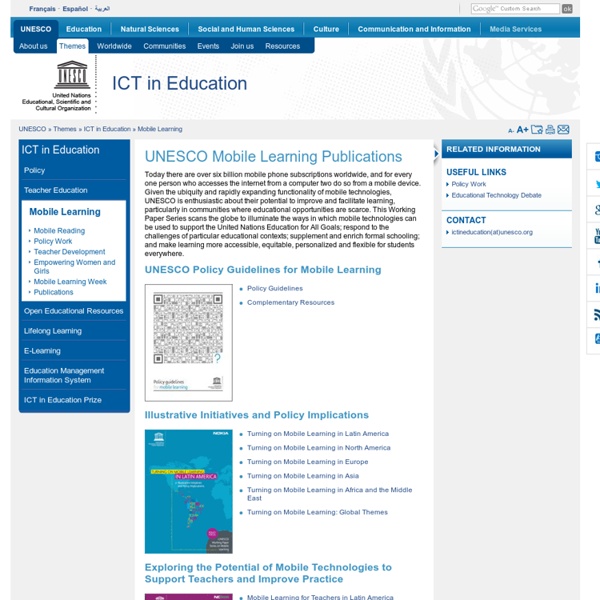Begin programming: build your first mobile game — University of Reading
Learn the basics of Java programming by developing a simple mobile game that you can run on your computer, Android phone, or tablet. Programming is everywhere: in dishwashers, cars and even space shuttles. This course will help you to understand how programs work and guide you through creating your own computer program – a mobile game. Whether you’re a complete newcomer to programming, or have some basic skills, this course provides a challenging but fun way to start programming in Java.
ITEA's Technology for All Americans Project
Technological Literacy Standards Briefings "Promoting Technological Literacy for All" ITEA has prepared a new set of ten videos that do a great job of explaining the ITEEA Standards for Technological Literacy (STL). Advancing Excellence in Technological Literacy (AETL), the four Addenda publications to STL and AETL, and other topics relevant to the standards. These are called the Technological Standards Briefings. Click here for the Technological Literacy Standards Briefings videos. Attention: Most of the links on this page lead directly to files in PDF format.
Mobile Learning
Pathway to a SMILE August 3, 2015 Key Takeaways This case study explains how SMILE — Synchronous Mobile Interactive Learning Environment — allows the instructor to present and record lessons anywhere, anyti… The Evolution Continues: Considerations for the Future of Research in Online and Blended Learning June 16, 2015 The model of online learning that has evolved over the past 20 years relies on ubiquitous data communications that are owned and operated routinely by all segments of the population.
Have your say: guidelines for writers and contributors
It is not wrong to assume that most development professionals are passionate about their work. Many are also good writers. But for those who need a little help to communicate their passion clearly in writing, this guide may be helpful. Practically, our content is usually about 800 words long.
Technology and Young Children
Key Messages When used intentionally and appropriately, technology and interactive media are effective tools to support learning and development. Intentional use requires early childhood teachers and administrators to have information and resources regarding the nature of these tools and the implications of their use with children.
Emerging trends in education and mobile learning
At the UNESCO Mobile Learning Week 2014 I sat on a panel titled Emerging Trends and New Technology – considered in the context of mobile learning. Below are the notes of the key points that I made. Note: The issue of Emerging Trends and New Technology begs the question: for who? For students in California, or for those in Kolkata? Developed country trends are very different from developing country trends. Most of the points below focus on the latter.
12 Principles Of Mobile Learning
12 Principles Of Mobile Learning by Terry Heick Ed note: This post has been updated and republished from a 2012 post
National Education Technology Plan
Contribute to the 2021 NETP Development If you would like to contribute to the development of the 2021 NETP, please share your thoughts here:Share your Input 2021 National Education Technology Plan The U.S. Department of Education is committed to leveraging the power of technology to rethink education and approach student learning in new ways.
10 Ways That Mobile Learning Will Revolutionize Education
Smartphones and tablet computers are radically transforming how we access our shared knowledge sources by keeping us constantly connected to near-infinite volumes of raw data and information. We enjoy unprecedented instant access to expertise, from informal cooking lessons on YouTube to online university courses. Every day people around the globe are absorbed in exciting new forms of learning, and yet traditional schools and university systems are still struggling to leverage the many opportunities for innovation in this area. Recently frog has been researching how learning models are evolving—and how they can be improved—via the influence of mobile technologies. We’ve found that the education industry needs new models and fresh frameworks to avoid losing touch with the radically evolving needs of its many current and potential new constituencies.
Bringing education to young mothers through mobiles
As we celebrate the International day of the girl today, we should take time to remember that young mothers are still girls, too. We need to do what we can to support them in their educational endeavours — even in means considered to be non-traditional. Mobile learning might be one way we can support young mothers when school interruptions occur due to early pregnancy. Here are some of my thoughts which draw upon the Kenyan context. Schooling and early pregnancy in Kenya With a high rate of early pregnancies among women in Kenya, female children in both primary and secondary school are increasingly being affected.
Professor Mike Sharples - People Profiles - Open University
Profile For further information see My research concerns human-centred design of new technologies for learning. It involves gaining a deep understanding of how people work, play, learn and interact as a foundation for the design of novel socio-technical systems (people in interaction with technology).



